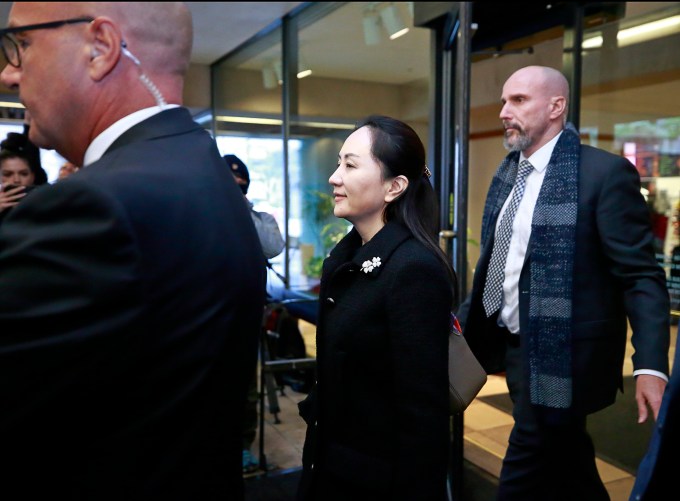Chinese Hostage Diplomacy, Canada's Meek Capitulation
"In my view, if the alliance was strong, the next time China embarked on hostage diplomacy, they would understand they have to change the way they do business."Guy Sainte-Jacques, former Canadian ambassador to Beijing"We will continue to challenge China when it comes to human rights being violated ... and cooperate on global challenges like climate change, because there is no easy path forward without China."Canadian Foreign Minister Francois-Philippe Champagne
 | |
| Huawei Technologies Chief Financial Officer Meng Wanzhou is escorted by her security personnel as she leaves court during a break for lunch on the first day of her extradition trial on January 20, 2020 in Vancouver, Canada. (Photo by Jeff Vinnick/Getty Images |
With the enforced detention on charges of espionage of two Canadians, Michael Kovrig and Michael Spavor, an ex-diplomat and entrepreneur respectively running into two years' imprisonment as a ploy by Beijing to force Canada into releasing Huawei's CFO, held in Canada under an extradition warrant issued by the United States, China and Canada have been at a stand-off in relations with Beijing imposing restrictions on commodity imports from Canada, and Canada reciprocating by attempting subtle pacification.
At the same time, urging its fellow democracies to place diplomatic pressure on Beijing to release the two Canadians, and resisting Beijing's efforts to force the release of Meng Wanzhou who flits from one to the other of her two Vancouver luxury mansions which she is confined to, awaiting extradition proceedings. A multilateral effort has been launched by Canada to address China's 'hostage diplomacy' that has fated two other Canadians with death sentences, accused of drug smuggling.
A former Canadian ambassador to Beijing speaks of the arbitrary detention discussions as an opportunity for collegial countries to impose automatic sanctions that all signatory nations would apply when China or any other country advanced their cause whatever it might happen to be, through taking hostages, to be released once their goal has been achieved.
The U.S., U.K., Germany, Australia, France, Denmark, Estonia, Latvia, Lithuania and Spain have all spoken out publicly condemning the detention of Kovrig and Spavor, and it is likely they would form the backbone along with Canada of any new alliance on arbitrary detention. Certainly the Canadian public has a fresher view of their country's relations with the Asian giant.
 |
| Michael Kovrig (left) and Michael Spavor (right) are seen in this composite image. One of Canada's most controversial ex-ambassadors to China says he repeatedly tried to improve the living conditions of Michael Kovrig and Michael Spavor after their imprisonment in the People's Republic almost two years ago. |
A newly released poll by the Asia Pacific Foundation reveals that impressions by the Canadian public of China are at an all-time low since 2010 when the same questions were asked, eliciting the response currently that Beijing's economic sweep of the world represents a threat not an opportunity as was once viewed. There are rumours that Canada is considering a pivot away from China, where once it viewed a free trade deal with the trade colossus as an achievably rewarding goal.
Minister Champagne's opinion was stated at the opening of a proposed new committee, stating the obvious, that relations with China are "complex and multi-imensional" with China "increasingly prepared to throw its weight around", so that like-minded countries have a need to defend themselves and uphold a rules-based international order. At the same time Canada is cautious about the risk of further offending Beijing and the cost inherent in so doing.
Trade looms large in the positives seen in Canada-China relations, as does the financial reward accruing to Canada through continued Chinese tourism in Canada and Chinese students studying in Canadian universities, to the point of being willing to overlook China's subversive interference in Canadian society, politics and the educational system, much less the crisis that has developed with the two detained Canadians languishing in a Chinese prison.
"To those who are seduced by this one-dimensional view [of resorting to the same 'tough talk' with China as Beijing's ambassadors have been indulging in with respect to Canada], I say this: While it is easy to be tough, let's consider to be smart", said Canada's Foreign Affairs Minister Champagne. While he thinks it is 'smart', critics of Canada's position vis-a-vis China's bullying would replace that with 'mealy-mouthed'.
But par for the course for a country that hasn't the courage of its presumed convictions.
 |
| Foreign Affairs Minister Francois-Philippe Champagne responds to a question during Question Period in the House of Commons Monday November 23, 2020 in Ottawa. (THE CANADIAN PRESS / Adrian Wyld) |
Labels: Canada, China, Hostages, Huawei, Michaels Kovrig/Spavor, Sanctions, Trade, United States

<< Home